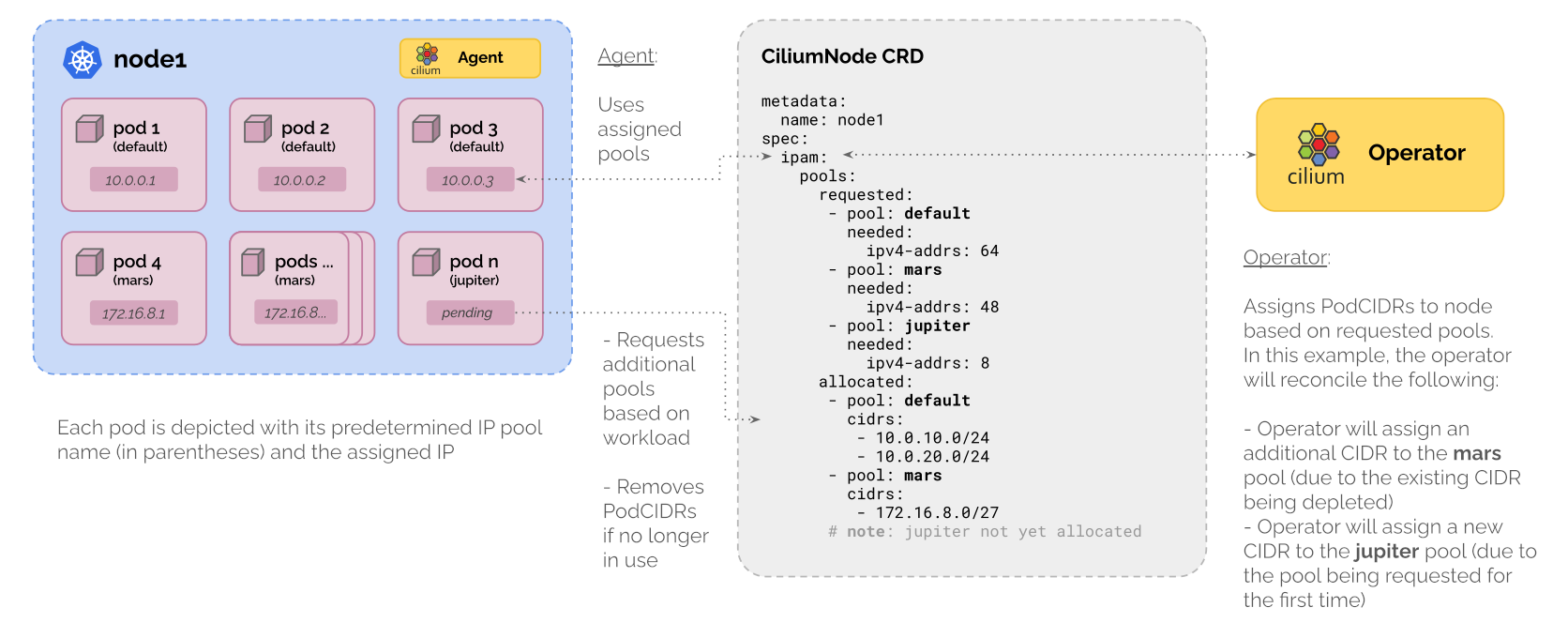Multi-Pool (Beta)
Note
This is a beta feature. Please provide feedback and file a GitHub issue if you experience any problems.
The Multi-Pool IPAM mode supports allocating PodCIDRs from multiple different IPAM pools, depending on properties of the workload defined by the user, e.g. annotations.
Architecture

When running in the Multi-Pool IPAM mode, Cilium will use the ipam.cilium.io/ip-pool annotation
on pods and namespaces to determine the IPAM pool from which a pod’s IP is allocated from.
If there is an
ipam.cilium.io/ip-pool=Aannotation on the pod itself, Cilium will allocate the pod’s IP from the pool namedA.If there is no annotation on the pod, but the namespace of the pod has an
ipam.cilium.io/ip-pool=Bannotation, Cilium will allocate the pod’s IP from the pool namedB.If neither the pod nor the namespace have a
ipam.cilium.io/ip-poolannotation, the pod’s IP will be allocated from the pool nameddefault.
The annotation is only considered when a pod is created. Changing the ip-pool
annotation on an already running pod has no effect.
The CiliumNode resource is extended with an additional spec.ipam.pools section:
spec.ipam.pools.requestedList of IPAM pool requests for this node. Each entry specifies the pool and the number of requested IP addresses. This field is owned and written to by the Cilium agent running on the particular node. It is read by the Cilium operator to fulfill the requests.
spec.ipam.pools.allocatedList of CIDRs allocated to this node and the pool they were allocated from. Cilium operator adds new PodCIDRs to this field. Cilium agent removes PodCIDRs it has released and is no longer using.
IP pools are managed using the cluster-wide CiliumPodIPPool custom resource.
Each CiliumPodIPPool contains the cluster-wide CIDR from which per-node
PodCIDRs are allocated:
apiVersion: cilium.io/v2alpha1
kind: CiliumPodIPPool
metadata:
name: green-pool
spec:
ipv4:
cidrs:
- 10.20.0.0/16
- 10.30.0.0/16
maskSize: 24
ipv6:
cidrs:
- fd00::/104
maskSize: 120
New pools can be added at run-time. The list of CIDRs in each pool can also be extended at run-time. In-use CIDRs may not be removed from an existing pool, and existing pools may not be deleted if they are still in use by a Cilium node. The mask size of a pool is immutable and the same for all nodes. Neither restriction is enforced until GitHub issue 26966 is resolved.
Configuration
Multi-Pool IPAM can be enabled using the ipam.mode=multi-pool Helm value.
To have the Cilium operator automatically create CiliumPodIPPools custom
resources at startup, use the ipam.operator.autoCreateCiliumPodIPPools Helm
value. It contains a map which follows the CiliumPodIPPools CRD schema
described above.
ipam:
mode: multi-pool
operator:
autoCreateCiliumPodIPPools:
default:
ipv4:
cidrs:
- 10.10.0.0/16
maskSize: 24
other:
ipv4:
cidrs:
- 10.20.0.0/16
maskSize: 24
Note
For a practical tutorial on how to enable this mode in Cilium, see CRD-Backed by Cilium Multi-Pool IPAM (Beta).
Allocation Parameters
Cilium agent can be configured to pre-allocate IPs from each pool. This behavior
can be controlled using the ipam-multi-pool-pre-allocation flag. It
contains a key-value map of the form <pool-name>=<preAllocIPs> where
preAllocIPs specifies how many IPs are to be pre-allocated to the local
node. The same number of IPs are pre-allocated for each address family. This
means that a pool which contains both IPv4 and IPv6 CIDRs will pre-allocate
preAllocIPs IPv4 addresses and preAllocIPs IPv6 addresses.
The flag defaults to default=8, which means it will pre-allocate 8 IPs from
the default pool. All other pools which do not have an entry in the
ipam-multi-pool-pre-allocation map are assumed to have a preAllocIPs of
zero, i.e. no IPs are pre-allocated for that pool.
Depending on the number of in-use IPs and the number of pending IP allocation
requests, Cilium agent might pre-allocate more than preAllocIPs IPs. The
formula Cilium agent uses to compute the absolute number of needed IPs from each
pool is:
neededIPs = roundUp(inUseIPs + pendingIPs + preAllocIPs, preAllocIPs)
Where inUseIPs is the number of IPs that are currently in use,
pendingIPs number of IPs that have a pending pod (i.e. pods which have been
scheduled on the node, but not yet received an IP), and preAllocIPs is the
minimum number of IPs that we want to pre-allocate as a buffer, i.e. the value
taken from the ipam-multi-pool-pre-allocation map.
Limitations
Multi-Pool IPAM is a preview feature. The following limitations apply to Cilium running in Multi-Pool IPAM mode:
Warning
Tunnel mode is not supported. Multi-Pool IPAM may only be used in direct routing mode.
Transparent encryption is only supported with WireGuard and cannot be used with IPSec.
IPAM pools with overlapping CIDRs are not supported. Each pod IP must be unique in the cluster due the way Cilium determines the security identity of endpoints by way of the IPCache.
Multi-Pool IPAM does not support local node routes (
enable-local-node-route) and requires the use of per-endpoint routes (see Native-Routing) instead.iptables-based masquerading requires
egressMasqueradeInterfacesto be set (see masquerading Implementation Modes and GitHub issue 22273 for details). Alternatively, eBPF-based masquerading is fully supported and may be used instead. Note that if the used IPAM pools do not belong to a common native-routing CIDR, you may want to useip-masq-agent, which allows multiple disjunct non-masquerading CIDRs to be defined. See Masquerading for details on how to use theip-masq-agentfeature.Announcing PodCIDRs by way of the built-in MetalLB BGP ControlPlane (deprecated) mode is not yet supported. Use
auto-direct-node-routesinstead.